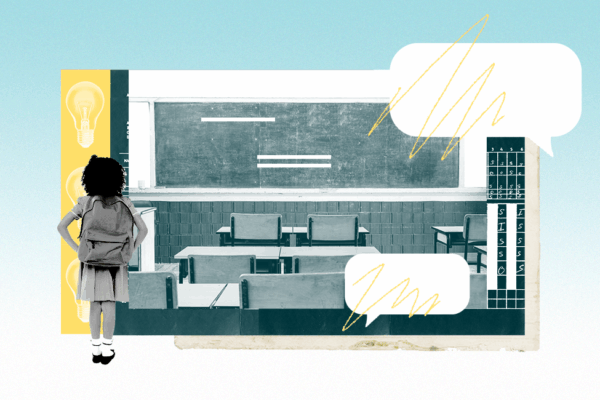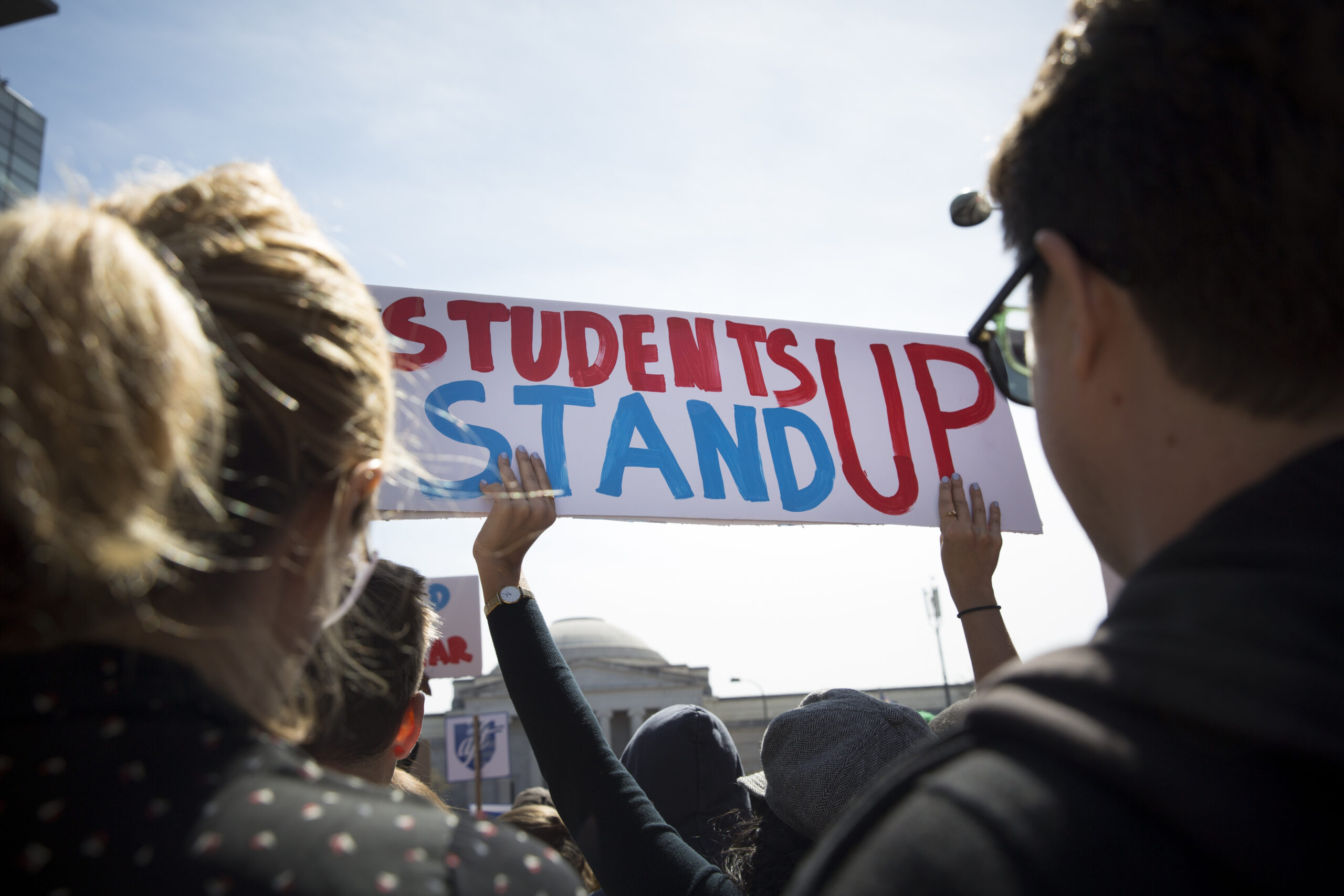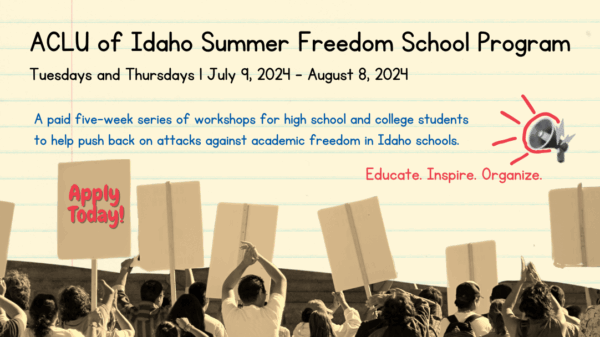HB 377, Inclusive Education, and Academic Freedom
Last updated: May 13, 2022 04:15 pm

Last year the Idaho legislature tried to ban inclusive education. In response, the ACLU of Idaho developed resources and information for K-12 and higher education faculty and students on academic freedom and free-speech rights. Scroll down for brief information sheets and slides from the presentations we did for faculty at Boise State University and the University of Idaho.
Last year the Idaho legislature tried to ban inclusive education. In response, the ACLU of Idaho developed resources and information for K-12 and higher education faculty and students on academic freedom and free-speech rights. Scroll down for brief information sheets and slides from the presentations we did for faculty at Boise State University and the University of Idaho.
Resources
K–12 TEACHERS: The First Amendment, Your Rights, AND HB 377
After passage of HB 377, teachers wondered how the law might affect teaching.
HB 377 is a state law that prohibits public schools and public charter schools from “direct[ing] or otherwise compel[ling] students to personally affirm, adopt, or adhere” to three tenets. The banned tenets are:
- “That any sex, race, ethnicity, religion, color, or national origin is inherently superior or inferior;”
- “That individuals should be adversely treated on the basis of their sex, race, ethnicity, religion, color, or national origin;” and
- “That individuals, by virtue of sex, race, ethnicity, religion, color, or national origin, are inherently responsible for actions committed in the past by other members of the same sex, race, ethnicity, religion, color, or national origin.”
- It also states: “No distinction or classification of students shall be made on account of race or color.” HB 377 does not include a specific penalty provision.
After the passage of HB 377, many teachers wondered how the law might affect their teaching. A state law cannot violate the federal constitution. For this reason, where HB377 is unclear, First Amendment federal constitutional law can provide helpful guidance. If HB 377 is used or enforced in a way that you think may interfere with your First Amendment rights or the rights of students, contact the ACLU of Idaho.
Compelled Speech
HB377 prohibits “directing or otherwise compelling” students. The First Amendment prohibits “compelled speech.” This means that a government actor, including a public school, cannot require a student to adopt a message that they do not agree with either in spoken or written words or in expressive actions. For example, a student cannot be required to participate in the pledge of allegiance.
Requiring students to discuss topics that they do not agree with in class, or to demonstrate their understanding of a topic through a paper or a test, for example, is not the same thing as compelled speech. So long as the student is not required to state that they personally believe or adopt the position, these are accepted parts of education. One Supreme Court justice wrote, “It is the special task of teachers to foster those habits of open-mindedness and critical inquiry which alone make for responsible citizens, who, in turn, make possible an enlightened and effective public opinion.
The Right to Receive Information
The right to receive ideas is necessary for the meaningful exercise of the right to speech and political freedom. Teachers can help students exercise their First Amendment rights by exposing them to a wide array of ideas and viewpoints. One Ninth Circuit case decided that the state cannot remove materials that would otherwise be available in a classroom, unless its actions are reasonably related to legitimate pedagogical concerns.
YOUR FIRST AMENDMENT RIGHT AS A K–12 PUBLIC SCHOOL TEACHER
As a public employee, your First Amendment rights depend on whether you are speaking as a private person, or as an employee.
If you are speaking as a private person (i.e., outside of school in your personal capacity) on a matter of public concern, you receive the full protections of the First Amendment. HB 377 should not affect your non-work activities.
If you are speaking as an employee (i.e., in furtherance of your official duties), then your First Amendment protections are more limited. Your school and union policies should clearly set out the rules for employee speech.
You also have a right not to be disciplined or face other negative consequences under a law or rule that is so unclear or vague that “people of ordinary intelligence” would not understand what is and is not prohibited.4 State law as well as your employment contract may provide other sources of rights and protections.
You can also visit the National Education Association’s Know Your Rights materials or their Frequently Asked Questions section to find additional information about how this law may affect your teachings.
IF YOU ARE DISCIPLINED FOR ASSIGNING OR DISCUSSING DIFFICULT TOPICS IN CLASS, OR EXPERIENCE HB 377 ENFORCEMENT (BOOKS BEING BANNED, CLASS CONTENT BEING CENSORED, ETC.)
- Write down everything you remember, including the names of the people involved and details surrounding the incident.
- Preserve any messages or other communications from the people involved.
- Research your school’s code of conduct and faculty policy, and any Collective Bargaining Agreements that apply to you.
- Investigate your university’s complaint processes and file a complaint.
- Contact an employment attorney to go over the facts of your case.
- Report to the ACLU of Idaho at https://intake.acluidaho.org/. We may be able to help in some cases.

HB 377 is a state law that prohibits public schools and public charter schools from “direct[ing] or otherwise compel[ling] students to personally affirm, adopt, or adhere” to three tenets. The banned tenets are:
- “That any sex, race, ethnicity, religion, color, or national origin is inherently superior or inferior;”
- “That individuals should be adversely treated on the basis of their sex, race, ethnicity, religion, color, or national origin;” and
- “That individuals, by virtue of sex, race, ethnicity, religion, color, or national origin, are inherently responsible for actions committed in the past by other members of the same sex, race, ethnicity, religion, color, or national origin.”
- It also states: “No distinction or classification of students shall be made on account of race or color.” HB 377 does not include a specific penalty provision.
After the passage of HB 377, many teachers wondered how the law might affect their teaching. A state law cannot violate the federal constitution. For this reason, where HB377 is unclear, First Amendment federal constitutional law can provide helpful guidance. If HB 377 is used or enforced in a way that you think may interfere with your First Amendment rights or the rights of students, contact the ACLU of Idaho.
Compelled Speech
HB377 prohibits “directing or otherwise compelling” students. The First Amendment prohibits “compelled speech.” This means that a government actor, including a public school, cannot require a student to adopt a message that they do not agree with either in spoken or written words or in expressive actions. For example, a student cannot be required to participate in the pledge of allegiance.
Requiring students to discuss topics that they do not agree with in class, or to demonstrate their understanding of a topic through a paper or a test, for example, is not the same thing as compelled speech. So long as the student is not required to state that they personally believe or adopt the position, these are accepted parts of education. One Supreme Court justice wrote, “It is the special task of teachers to foster those habits of open-mindedness and critical inquiry which alone make for responsible citizens, who, in turn, make possible an enlightened and effective public opinion.
The Right to Receive Information
The right to receive ideas is necessary for the meaningful exercise of the right to speech and political freedom. Teachers can help students exercise their First Amendment rights by exposing them to a wide array of ideas and viewpoints. One Ninth Circuit case decided that the state cannot remove materials that would otherwise be available in a classroom, unless its actions are reasonably related to legitimate pedagogical concerns.
YOUR FIRST AMENDMENT RIGHT AS A K–12 PUBLIC SCHOOL TEACHER
As a public employee, your First Amendment rights depend on whether you are speaking as a private person, or as an employee.
If you are speaking as a private person (i.e., outside of school in your personal capacity) on a matter of public concern, you receive the full protections of the First Amendment. HB 377 should not affect your non-work activities.
If you are speaking as an employee (i.e., in furtherance of your official duties), then your First Amendment protections are more limited. Your school and union policies should clearly set out the rules for employee speech.
You also have a right not to be disciplined or face other negative consequences under a law or rule that is so unclear or vague that “people of ordinary intelligence” would not understand what is and is not prohibited.4 State law as well as your employment contract may provide other sources of rights and protections.
You can also visit the National Education Association’s Know Your Rights materials or their Frequently Asked Questions section to find additional information about how this law may affect your teachings.
IF YOU ARE DISCIPLINED FOR ASSIGNING OR DISCUSSING DIFFICULT TOPICS IN CLASS, OR EXPERIENCE HB 377 ENFORCEMENT (BOOKS BEING BANNED, CLASS CONTENT BEING CENSORED, ETC.)
- Write down everything you remember, including the names of the people involved and details surrounding the incident.
- Preserve any messages or other communications from the people involved.
- Research your school’s code of conduct and faculty policy, and any Collective Bargaining Agreements that apply to you.
- Investigate your university’s complaint processes and file a complaint.
- Contact an employment attorney to go over the facts of your case.
- Report to the ACLU of Idaho at https://intake.acluidaho.org/. We may be able to help in some cases.
Right to Learn: Your Guide to Combatting Classroom Censorship
Here is a comprehensive ACLU toolkit to help you fight against censorship in your schools and communities.
These resources are designed for further understanding of who passes laws that affect your education and how you can take action to protect your right to learn. Explore to learn more about how you can reach out and get your demands heard.
Since 2021, dozens of states have moved to introduce and pass classroom censorship bills that restrict students and teachers from discussing race, gender, and sexual orientation in public schools. At the same time, politicians and school boards are making moves to ban books — predominately those by Black and LGBTQ authors — from public schools and libraries.
Imagine not being able to freely talk about our country’s history of slavery, or not being able to access books from your public library such as Toni Morrison’s “Beloved” or Maia Kobabe’s “Gender Queer” that speak to issues related to race, gender, and sexuality that impact our daily lives. This is exactly what state lawmakers across the country are trying to make happen.
All young people have a First Amendment right to learn free from censorship or discrimination. The ACLU is committed to defending all student’s right to learn, and we need your help.
We hope you will use the resources in this toolkit to help combat classroom censorship efforts in your own school/school districts. Our campaign is thrilled to count on your support! Now, there is no time to waste, so let’s get started and do our part to ensure that everyone has the right to learn.
Click on the link below to access the toolkit.

These resources are designed for further understanding of who passes laws that affect your education and how you can take action to protect your right to learn. Explore to learn more about how you can reach out and get your demands heard.
Since 2021, dozens of states have moved to introduce and pass classroom censorship bills that restrict students and teachers from discussing race, gender, and sexual orientation in public schools. At the same time, politicians and school boards are making moves to ban books — predominately those by Black and LGBTQ authors — from public schools and libraries.
Imagine not being able to freely talk about our country’s history of slavery, or not being able to access books from your public library such as Toni Morrison’s “Beloved” or Maia Kobabe’s “Gender Queer” that speak to issues related to race, gender, and sexuality that impact our daily lives. This is exactly what state lawmakers across the country are trying to make happen.
All young people have a First Amendment right to learn free from censorship or discrimination. The ACLU is committed to defending all student’s right to learn, and we need your help.
We hope you will use the resources in this toolkit to help combat classroom censorship efforts in your own school/school districts. Our campaign is thrilled to count on your support! Now, there is no time to waste, so let’s get started and do our part to ensure that everyone has the right to learn.
Click on the link below to access the toolkit.
UNIVERSITY FACULTY: YOUR ACADEMIC FREEDOM AND FREE SPEECH RIGHTS
After the passage of HB 377, many university faculty members have found preparing syllabi and teaching classes stressful and fraught.
After the passage of HB 377, many university faculty members have found preparing syllabi and teaching classes stressful and fraught. But the U.S. Supreme Court has made clear how important academic freedom is in our democracy. Academic freedom allows for the free exchange of ideas and the expression of differing and even unpopular views, including by professors.
The guide below is to help you understand your rights, alleviate some of the anxieties you may have experienced, and prepare you in case you face a student-complaint of “indoctrination.”
DOES ACADEMIC FREEDOM APPLY TO ME?
- Academic freedom applies to full-time, part-time, tenure and tenure-track, adjunct professors and lecturers, graduate student instructors, and research assistants.
- U.S. Supreme Court precedent has recognized the importance of the First Amendment on university campuses. The government, which includes state university administration, cannot compel university faculty to avoid discussing controversial topics or viewpoints.
ACADEMIC FREEDOM INSIDE THE CLASSROOM
- You generally have the right to determine the pedagogy of the courses you teach.
- You generally have the right to select course materials and content, create assignments, and assess student performance.
- You generally have the right to make statements that are germane to the subject matter of your class.
- Academic freedom does NOT protect faculty from critique or criticism.
- Academic freedom does NOT protect against professional ignorance, incompetence, or dishonesty.
- Academic freedom is limited by university policies, such as grading policies.
- Academic freedom is limited by protections against hostile work and learning environments.
YOUR RIGHTS OUTSIDE THE CLASSROOM
- You have the right to express your relevant expertise (inside and outside the classroom) to the public on matters of social, political, or economic concern through any means of communication.
- You have the right to conduct research and publish conclusions based in evidence.
WHAT ABOUT SAYING “WHITE PRIVILEGE” OR DISCUSSING STRUCTURAL RACISM IN THE CLASSROM?
- You have a right to expose students to unpopular and controversial ideas that are of public concern.
- A student may complain about a professor’s behavior or class content. But those complaints cannot form the foundation of a legitimate adverse employment action if they relate merely to a professors’ legitimate class content or teaching style.
- HB 377 prohibits directing students “to personally affirm, adopt, or adhere” to various tenets. If you already avoid directing students to adopt certain views, and instead try only to broaden students’ worldviews by proposing new ideas, HB 377 should not, on its own, change your teaching methods.
- So long as you can establish that your lessons are evidence-based and germane to the subject of the class you are teaching, discussion of controversial topics is generally protected by the First Amendment.
IF YOUR SCHOOL INVESTIGATES YOU OR TAKES ANY ACTION AGAINST YOU FOR DISCUSSING DIFFICULT TOPICS IN CLASS:
- Write down everything you remember, including the names of the people involved and details surrounding the incident.
- Preserve any messages or other communications from the people involved.
- Research your university’s code of conduct and faculty policy.
- Investigate your university’s complaint processes and file a complaint.
- Contact an employment attorney to go over the facts of your case.
- Report to the ACLU of Idaho at https://intake.acluidaho.org. We may be able to help in some cases.

After the passage of HB 377, many university faculty members have found preparing syllabi and teaching classes stressful and fraught. But the U.S. Supreme Court has made clear how important academic freedom is in our democracy. Academic freedom allows for the free exchange of ideas and the expression of differing and even unpopular views, including by professors.
The guide below is to help you understand your rights, alleviate some of the anxieties you may have experienced, and prepare you in case you face a student-complaint of “indoctrination.”
DOES ACADEMIC FREEDOM APPLY TO ME?
- Academic freedom applies to full-time, part-time, tenure and tenure-track, adjunct professors and lecturers, graduate student instructors, and research assistants.
- U.S. Supreme Court precedent has recognized the importance of the First Amendment on university campuses. The government, which includes state university administration, cannot compel university faculty to avoid discussing controversial topics or viewpoints.
ACADEMIC FREEDOM INSIDE THE CLASSROOM
- You generally have the right to determine the pedagogy of the courses you teach.
- You generally have the right to select course materials and content, create assignments, and assess student performance.
- You generally have the right to make statements that are germane to the subject matter of your class.
- Academic freedom does NOT protect faculty from critique or criticism.
- Academic freedom does NOT protect against professional ignorance, incompetence, or dishonesty.
- Academic freedom is limited by university policies, such as grading policies.
- Academic freedom is limited by protections against hostile work and learning environments.
YOUR RIGHTS OUTSIDE THE CLASSROOM
- You have the right to express your relevant expertise (inside and outside the classroom) to the public on matters of social, political, or economic concern through any means of communication.
- You have the right to conduct research and publish conclusions based in evidence.
WHAT ABOUT SAYING “WHITE PRIVILEGE” OR DISCUSSING STRUCTURAL RACISM IN THE CLASSROM?
- You have a right to expose students to unpopular and controversial ideas that are of public concern.
- A student may complain about a professor’s behavior or class content. But those complaints cannot form the foundation of a legitimate adverse employment action if they relate merely to a professors’ legitimate class content or teaching style.
- HB 377 prohibits directing students “to personally affirm, adopt, or adhere” to various tenets. If you already avoid directing students to adopt certain views, and instead try only to broaden students’ worldviews by proposing new ideas, HB 377 should not, on its own, change your teaching methods.
- So long as you can establish that your lessons are evidence-based and germane to the subject of the class you are teaching, discussion of controversial topics is generally protected by the First Amendment.
IF YOUR SCHOOL INVESTIGATES YOU OR TAKES ANY ACTION AGAINST YOU FOR DISCUSSING DIFFICULT TOPICS IN CLASS:
- Write down everything you remember, including the names of the people involved and details surrounding the incident.
- Preserve any messages or other communications from the people involved.
- Research your university’s code of conduct and faculty policy.
- Investigate your university’s complaint processes and file a complaint.
- Contact an employment attorney to go over the facts of your case.
- Report to the ACLU of Idaho at https://intake.acluidaho.org. We may be able to help in some cases.
UNIVERSITY STUDENTS: HB 377 AND YOUR FREE SPEECH RIGHTS
After passage of HB 377, many university students wondered how the law might affect their education, research, teaching, and other activities.
HB 377 is a state law that prohibits public schools and public charter schools from “direct[ing] or otherwise compel[ling] students to personally affirm, adopt, or adhere” to three tenets. The banned tenets are:
- “That any sex, race, ethnicity, religion, color, or national origin is inherently superior or inferior;”
- “That individuals should be adversely treated on the basis of their sex, race, ethnicity, religion, color, or national origin;” and
- “That individuals, by virtue of sex, race, ethnicity, religion, color, or national origin, are inherently responsible for actions committed in the past by other members of the same sex, race, ethnicity, religion, color, or national origin.”
It also states: “No distinction or classification of students shall be made on account of race or color.” HB 377 does not include a specific penalty provision.
After the passage of HB 377, many university students wondered how the law might affect their education, research, teaching, and extracurricular activities. But the First Amendment protects the right to express and receive controversial viewpoints, and the Supreme Court has recognized that academic freedom is essential to democracy. The guide below is to help you understand your rights and alleviate some of the anxieties you may be experiencing.
YOUR FIRST AMENDMENT RIGHTS AS A STUDENT
The First Amendment protects free speech. Universities can generally regulate the time, place, and manner of expression, but cannot prohibit students’ speech based on the viewpoints they express. For example:
- Schools can require students to get permission before speaking through a loudspeaker on campus before 9 am, and a teacher could punish students for screaming through a class.
- Schools cannot prohibit students from protesting because they disagree with the protest’s cause or prohibit students from forming a student group because the group’s ideology runs counter to the administration.
- A school can limit where students can post fliers on campus but cannot prohibit particular groups from posting fliers.
Because access to ideas is essential to meaningful speech, the First Amendment protects access to ideas and information, too. Access to information and ideas in school prepares students for active and effective participation in our pluralistic society. This means that the state cannot restrict class content based on disagreement with the viewpoints expressed. For example:
- A college can make changes to curriculum because it finds that students are more interested in a certain field of study, or because a department chair determines that the standards in the field have changed and students should learn these new developments.
- A school cannot prohibit teaching a subject because the topic is controversial or upsetting to some people.
The Constitution and civil rights also require equal access to education and protect against a hostile education environment. When courts look at whether speech in the classroom violates someone’s rights, they ask whether the speech was related to a legitimate education objective. For example:
- A professor who used racist language in a class discussing the functions of hostile speech in society did not violate students’ rights. A school that required students to read a book on Islam in a course discussing world religions did not violate students’ rights.
- A professor who used sexist language in the classroom that was not related to the course topic of calculus violated students’ civil rights.
YOUR FIRST AMENDMENT RIGHTS AS A TEACHING ASSISTANT
If you already avoid directing students to adopt certain views, and instead try only to broaden students’ worldviews by proposing new ideas, HB 377 should not, on its own, change your teaching methods. As a teaching assistant, you generally have academic freedom to discuss controversial topics and expose your students to various viewpoints.
Academic freedom does NOT protect you from critique or criticism.
Academic freedom is limited by collective bargaining agreements, university policies, such as grading policies, and by protections against hostile work and learning environments.
YOUR FIRST AMENDMENT RIGHT TO PROTEST ON CAMPUS
HB 377 does not affect your constitutional right to protest.
Causing discomfort or offense is not a valid reason for a school to shut down a protest.
The First Amendment does not protect harassment, true threats of physical violence, or speech that intentionally and effectively provokes a crowd to immediately carry out violent and unlawful action.
IF YOU ARE DISCIPLINED FOR DISCUSSING DIFFICULT TOPICS IN CLASS, OR EXPERIENCE HB 377 AFFECTING YOUR EDUCATION
- Write down everything you remember, including the names of the people involved and details surrounding the incident.
- Preserve any messages or other communications from the people involved.
- Contact the ACLU of Idaho at https://intake.acluidaho.org/. We may be able to help.

HB 377 is a state law that prohibits public schools and public charter schools from “direct[ing] or otherwise compel[ling] students to personally affirm, adopt, or adhere” to three tenets. The banned tenets are:
- “That any sex, race, ethnicity, religion, color, or national origin is inherently superior or inferior;”
- “That individuals should be adversely treated on the basis of their sex, race, ethnicity, religion, color, or national origin;” and
- “That individuals, by virtue of sex, race, ethnicity, religion, color, or national origin, are inherently responsible for actions committed in the past by other members of the same sex, race, ethnicity, religion, color, or national origin.”
It also states: “No distinction or classification of students shall be made on account of race or color.” HB 377 does not include a specific penalty provision.
After the passage of HB 377, many university students wondered how the law might affect their education, research, teaching, and extracurricular activities. But the First Amendment protects the right to express and receive controversial viewpoints, and the Supreme Court has recognized that academic freedom is essential to democracy. The guide below is to help you understand your rights and alleviate some of the anxieties you may be experiencing.
YOUR FIRST AMENDMENT RIGHTS AS A STUDENT
The First Amendment protects free speech. Universities can generally regulate the time, place, and manner of expression, but cannot prohibit students’ speech based on the viewpoints they express. For example:
- Schools can require students to get permission before speaking through a loudspeaker on campus before 9 am, and a teacher could punish students for screaming through a class.
- Schools cannot prohibit students from protesting because they disagree with the protest’s cause or prohibit students from forming a student group because the group’s ideology runs counter to the administration.
- A school can limit where students can post fliers on campus but cannot prohibit particular groups from posting fliers.
Because access to ideas is essential to meaningful speech, the First Amendment protects access to ideas and information, too. Access to information and ideas in school prepares students for active and effective participation in our pluralistic society. This means that the state cannot restrict class content based on disagreement with the viewpoints expressed. For example:
- A college can make changes to curriculum because it finds that students are more interested in a certain field of study, or because a department chair determines that the standards in the field have changed and students should learn these new developments.
- A school cannot prohibit teaching a subject because the topic is controversial or upsetting to some people.
The Constitution and civil rights also require equal access to education and protect against a hostile education environment. When courts look at whether speech in the classroom violates someone’s rights, they ask whether the speech was related to a legitimate education objective. For example:
- A professor who used racist language in a class discussing the functions of hostile speech in society did not violate students’ rights. A school that required students to read a book on Islam in a course discussing world religions did not violate students’ rights.
- A professor who used sexist language in the classroom that was not related to the course topic of calculus violated students’ civil rights.
YOUR FIRST AMENDMENT RIGHTS AS A TEACHING ASSISTANT
If you already avoid directing students to adopt certain views, and instead try only to broaden students’ worldviews by proposing new ideas, HB 377 should not, on its own, change your teaching methods. As a teaching assistant, you generally have academic freedom to discuss controversial topics and expose your students to various viewpoints.
Academic freedom does NOT protect you from critique or criticism.
Academic freedom is limited by collective bargaining agreements, university policies, such as grading policies, and by protections against hostile work and learning environments.
YOUR FIRST AMENDMENT RIGHT TO PROTEST ON CAMPUS
HB 377 does not affect your constitutional right to protest.
Causing discomfort or offense is not a valid reason for a school to shut down a protest.
The First Amendment does not protect harassment, true threats of physical violence, or speech that intentionally and effectively provokes a crowd to immediately carry out violent and unlawful action.
IF YOU ARE DISCIPLINED FOR DISCUSSING DIFFICULT TOPICS IN CLASS, OR EXPERIENCE HB 377 AFFECTING YOUR EDUCATION
- Write down everything you remember, including the names of the people involved and details surrounding the incident.
- Preserve any messages or other communications from the people involved.
- Contact the ACLU of Idaho at https://intake.acluidaho.org/. We may be able to help.
Related Content

ACLU Idaho Freedom School Program (Online)
Stay Informed
Sign up to be the first to hear about how to take action.
By completing this form, I agree to receive occasional emails per the terms of the ACLU’s privacy statement.
By completing this form, I agree to receive occasional emails per the terms of the ACLU’s privacy statement.
